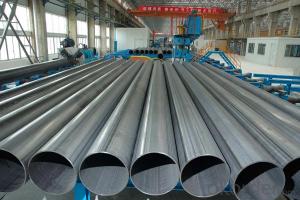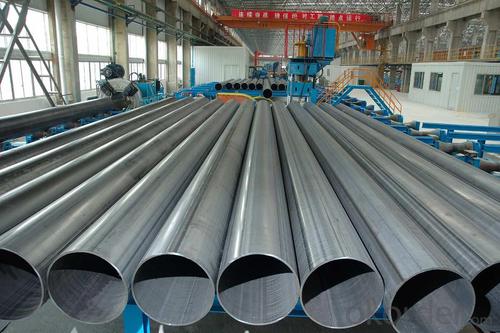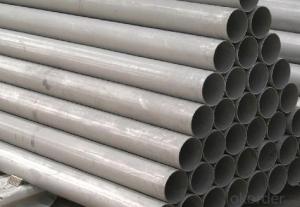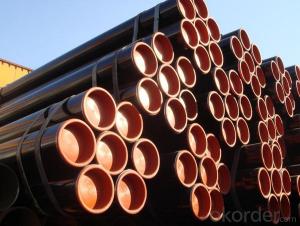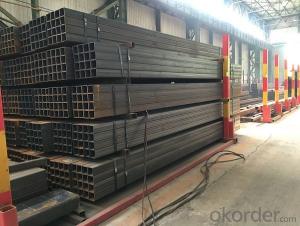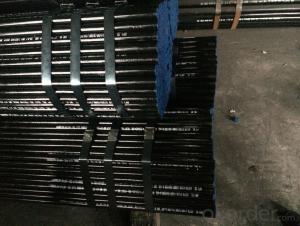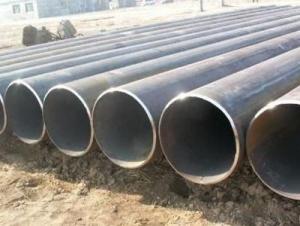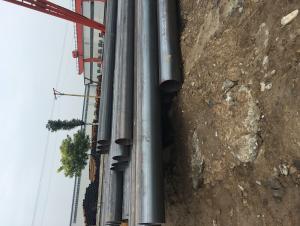ERW Carbon Steel Line Pipe for Oil and Gas
- Loading Port:
- Tianjin
- Payment Terms:
- TT or LC
- Min Order Qty:
- 20 m.t.
- Supply Capability:
- 15000 m.t./month
OKorder Service Pledge
OKorder Financial Service
You Might Also Like
1、Structure of Welded Steel Tube:
We are company that have many years experience and professional manager team and engineer team and sales team, sure we will provide you high quality of pipe and professioanl service.Welded Steel Tube is formed by drawing a solid billet over a piercing rod to create the hollow shell. We are company that have many years experience and professional manager team and engineer team and sales team, sure we will provide you high quality of welded pipe and professioanl service.
2、Main Features of the Welded Steel Tube:
• High manufacturing accuracy
• The higher strength
• The small inertia resistance
• Strong heat dissipation ability
• Good visual effect
• Satisfy price
3、Welded Steel Tube Specification:
Standard | GB, DIN, ASTM ASTM A106-2006, ASTM A53-2007 |
Grade | 10#-45#, 16Mn 10#, 20#, 45#, 16Mn |
Thickness | 8 - 33 mm |
Section Shape | Round |
Outer Diameter | 133 - 219 mm |
Place of Origin | Shandong, China (Mainland) |
Secondary Or Not | Non-secondary |
Application | Hydraulic Pipe |
Technique | Cold Drawn |
Certification | API |
Surface Treatment | factory state or painted black |
Special Pipe | API Pipe |
Alloy Or Not | Non-alloy |
Length | 5-12M |
Outer Diameter | 21.3-610mm |
Grade | 20#, 45#, Q345, API J55, API K55, API L80, API N80, API P110, A53B |
Standard | ASME, ASTM |
1) Material:20#(ASTM A 106/A53 GRB.API5LGRB,GB),45#,16Mn,10#.
2) Specification range:OD:21.3-610mm,WT:6-70mm,length:6-12m or according to the requirement of clients.
3) Excutive standards:GB,ASME API5L.ASTM A 106/A53,Despite of the above standards,we can also supply seamless steel pipe with standard of DIN,JIS,and so on,and also develop new products according to the requirements of our clients!
4) Surface:black lacquered,varnish coating or galvanized.
5) Ends:Beveled or square cut,plastic capped,painted.
6) Packing:bundles wrapped with strong steel strip,seaworthy packing.
4、Packaging & Delivery
Packaging Details: | seaworthy package,bundles wrapped with strong steel strip |
Delivery Detail: | 15-30days after received 30%TT |
5、FAQ of Welded Steel Tube:
①How is the quality of your products?
Our products are strictly in accordance with international and domestic standard. We test on every pipe before delivery. Any quality certification or testing report you want to see, please tell us.
Guaranteed: If products’ quality is not in accordance with description as we provide or the promise before you place order, we promise 100% refund.
②How about the price?
Yes, we are factory and be capable of offering you the lowest price. One of our policy is that “ to save time and be absolutely honest with our business relationship, we quote as low as possible for every client, and discount can be given according to the quantity”, if you are interested in bargain and dissatisfy our factory price, just don’t waste your time. Our quotation is professional.
③Why should you choose us?
Choice happens because of our quality and price. Additionally, we can also offer professional products inquiry, products knowledge train (for agents), fast goods delivery, outstanding customer solution proposals. Our service formula: good quality + good price + good service=customer’s trust.
SGS test is available. Customer inspection before shipping is welcome. Third party inspection is OK.
6、 Welded Steel Tube Images:
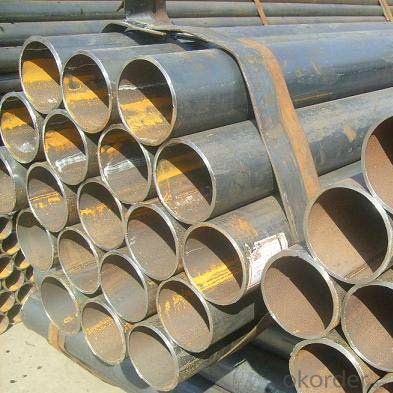
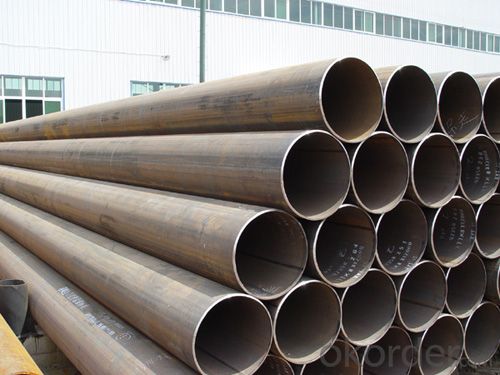
- Q: What is the standard length of a steel pipe?
- The industry and application dictate the standard length of a steel pipe, which can vary. In general, steel pipes typically range from 18 to 24 feet in length. These lengths find common usage in construction, plumbing, and various industrial applications. It is worth mentioning that custom lengths are also available to accommodate specific project needs.
- Q: How are steel pipes used in the manufacturing of boilers and heat exchangers?
- Steel pipes are used in the manufacturing of boilers and heat exchangers primarily for their excellent strength, durability, and heat resistance properties. These pipes are used to carry hot fluids and gases, such as water and steam, throughout the boiler or heat exchanger system. The steel pipes provide a reliable and efficient means of transferring heat and maintaining the desired temperature within the system. Additionally, their corrosion resistance ensures long-lasting performance, making them an essential component in the manufacturing of boilers and heat exchangers.
- Q: How are steel pipes used in the manufacturing of chemical processing plants?
- Steel pipes are commonly used in the manufacturing of chemical processing plants due to their durability, high strength, and resistance to corrosion. These pipes are typically used for the transportation of various chemicals, gases, and liquids within the plant. They help maintain the integrity of the materials being processed and ensure the safe and efficient operation of the plant.
- Q: How are steel pipes used in firefighting systems?
- Steel pipes are used in firefighting systems to transport water or other fire-suppressing agents from a water source to the location of a fire. These pipes are durable and resistant to heat, making them suitable for carrying large volumes of water at high pressure to extinguish fires effectively. Additionally, steel pipes are often used for underground or overhead fire hydrant systems, sprinkler installations, and standpipe systems in buildings to ensure a reliable and efficient firefighting infrastructure.
- Q: How do steel pipes handle seismic expansion joints?
- Steel pipes handle seismic expansion joints by allowing for movement and flexibility. These pipes are designed to withstand the forces caused by seismic activity, such as earthquakes, by accommodating expansion and contraction without causing damage to the overall structure. The joints in steel pipes are often equipped with specialized components, such as bellows or flexible couplings, that can absorb the movement and prevent excessive stress on the pipeline. This ensures the integrity and safety of the pipeline system during seismic events.
- Q: Can steel pipes be used for chemical processing plants?
- Yes, steel pipes can be used for chemical processing plants. Steel pipes are commonly used in chemical processing plants due to their high strength, durability, and resistance to corrosion. They can effectively handle the high temperatures, pressures, and corrosive chemicals involved in various chemical processes. Additionally, steel pipes can be easily welded and connected, making them suitable for complex piping systems within chemical plants.
- Q: Can steel pipes be painted?
- Yes, steel pipes can be painted. The process typically involves cleaning and preparing the surface, applying a primer, and then using a suitable paint or coating to achieve the desired finish.
- Q: What is the maximum length of a steel pipe?
- The maximum length of a steel pipe will vary depending on various factors such as manufacturing capabilities, transportation limitations, and practical considerations. However, in general, steel pipes can typically be manufactured and transported in lengths ranging from a few meters to several hundred meters.
- Q: How can seamless steel tubes be produced?
- Tube mill, round tube billet, heating, perforation, three roll cross rolling, rolling or extrusion, removal of pipe, sizing (or reducing diameter), cooling, straightening, water pressure test (or flaw detection), marking, storage, cold rolling and hot rolling. Generally cold rolling, because of high accuracy.
- Q: How are steel pipes made?
- Steel pipes are made through a process called pipe manufacturing, which involves multiple steps. Firstly, raw steel is melted in a furnace and then subjected to continuous casting to form a solid billet. This billet is then heated and pierced to create a hollow tube called a shell. Next, the shell is rolled and stretched to the desired diameter and thickness using a series of rollers. The pipe is then subjected to a process called welding, where two edges of the shell are fused together to create a seamless or welded pipe. Finally, the pipe undergoes various finishing processes such as cutting, straightening, and inspection before being ready for use.
Send your message to us
ERW Carbon Steel Line Pipe for Oil and Gas
- Loading Port:
- Tianjin
- Payment Terms:
- TT or LC
- Min Order Qty:
- 20 m.t.
- Supply Capability:
- 15000 m.t./month
OKorder Service Pledge
OKorder Financial Service
Similar products
Hot products
Hot Searches
Related keywords
